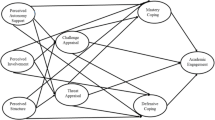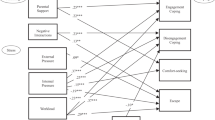Abstract
The current study tested the hypothesis that coping with stress is associated with the individual's cognitive appraisals of the stressor and of their resources for coping with the stressor. Fifty-two children between 8.5 and 12 years of age who were experiencing the separation or divorce of their parents were given a measure of appraisals of divorce and a measure of appraisals of coping options. Their parents and teachers filled out behavior checklists, and teachers reported their classroom grades. For boys, appraisals of divorce situations were related to behavior in the home but not in the school. Boys' adaptive appraisals tended to be more strongly associated with behavior than were maladaptive appraisals. Their appraisals of coping options were related to personal adjustment in both the home and the school, but not to academic performance. For girls, only a few of the relationships between cognition and psychosocial adjustment were significant, possibly because of their restricted range of grades and scores on the behavior checklists. These findings provide partial support for the prediction that coping is related to appraisals of stressful events and of one's resources for coping with the events.
Similar content being viewed by others

References
Butler, L., & Meichenbaum, D. (1981). The assessment of interpersonal problem-solving skills. In P. C. Kendall & S. D. Hollon (Eds.),Assessment strategies for cognitive-behavioral interventions (pp. 197–226). New York: Academic Press.
Cacioppo, J. T., Glass, C. R., & Merluzzi, T. V. (1979). Self-statements and self-evaluations: A cognitive response analysis of heterosocial anxiety.Cognitive Therapy and Research, 3 249–262.
Coddington, R. D. (1972). The significance of life events as etiologic factors in the diseases of children.Journal of Psychosomatic Research, 16 7–8.
Cowen, E. L., Dorr, D., Clarfield, S., Kreling, B., McWilliams, S., Pokracki, F., Pratt, D. M., Terrel, D., & Wilson, A. (1973). The AML: A quick screening device for early identification of school maladaptation.American Journal of Community Psychology, 1 12–35.
Craighead, W. E., Kimball, W. H., & Rehak, P. J. (1979). Mood changes, physiological responses, and self-statements during social rejection imagery.Journal of Consulting and Clinical Psychology, 47 385–396.
Despert, J. L. (1953).Children of divorce. New York: Doubleday.
D'Zurilla, T., & Goldfried, M. (1971). Problem solving and behavior modification.Journal of Abnormal Psychology, 78 107–126.
Emery, R. E. (1982). Interparental conflict and the children of discord and divorce.Psychological Bulletin, 92 310–330.
Felner, R. D., Farber, S. S., & Primavera, J. (1980). Children of divorce, stressful life events and transitions: A framework for preventive efforts. In R. H. Price, R. F. Ketterer, B. C. Bader, & J. Monahan (Eds.),Prevention in mental health: Research, policy and practice. Beverly Hills: Sage.
Felner, R. D., Ginter, M. A., Boike, M. F., & Cowen, E. L. (1981). Parental death or divorce and the school adjustment of young children.American Journal of Community Psychology, 9 181–191.
Felner, R. D., Stolberg, A., & Cowen, E. L. (1975). Crisis events and school mental health referral patterns of young children.Journal of Consulting and Clinical Psychology, 43 305–310.
Gardner, R. (1976).Psychotherapy with children of divorce. New York: Aronson.
Gardner, R. (1977).The parents book about divorce. Garden City, New York: Doubleday.
Guidubaldi, J., Cleminshaw, H. K., Perry, J. D., & Mclaughlin, C. S. (1983). The impact of parental divorce on children: Report of the nationwide NASP study.School Psychology Review, 12 300–323.
Guttentag, M., Salasin, S., & Belle, D. (1980).The mental health of women. New York: Academic Press.
Hess, R. D., & Camara, K. A. (1979). Post-divorce family relationships as mediating factors in the consequences of divorce for children.Journal of Social Issues, 4 79–96.
Hetherington, E. M., Cox, M., & Cox, R. (1978). The aftermath of divorce. In J. H. Stevens & M. Matthews (Eds.).Mother-child; father-child relations. Washington, D.C.: National Association for the Education of Young Children.
Hetherington, E. M., Cox, M., & Cox, R. (1979a). The aftermath of divorce. In J. H. Stevens, Jr., & M. Matthews (Eds.),Mother-child, father-child relations. Washington, D.C.: National Association for the Education of Young Children.
Hetherington, E. M., Cox, M., & Cox, R. (1979b). Play and social interaction in children following divorce.Journal of Social Issues, 35 26–49.
Hodges, W. F., Buchsbaum, H. K., & Tierney, C. W. (1983). Parent-child relationships and adjustment in preschool children in divorced and intact families.Journal of Divorce, 7 43–57.
Hodges, W. F., Wechsler, R. C., & Ballantine, C. (1979). Divorce and the preschool child: Cumulative stress.Journal of Divorce, 3 55–68.
Jacobson, D. S. (1978). The impact of divorce/separation on children: II. Interparent hostility and child adjustment.Journal of Divorce, 3–20.
Kalter, D. (1979). Children of divorce in an outpatient psychiatric population.American Journal of Orthopsychiatry, 46 20–32.
Kanner, A. D., Coyne, J. C., Schaefer, C., & Lazarus, R. S. (1981). Comparison of two modes of stress measurement: Daily hassles and uplifts versus major life events.Journal of Behavioral Medicine, 4 1–39.
Kendall, P., Williams, L., Pechacek, T., Graham, L., Shisslak, C., & Herzoff, N. (1979). Cognitive-behavioral and patient education interventions in cardiac catheterization procedures: The Palo Alto Medical Psychology Project.Journal of Consulting and Clinical Psychology, 47 49–58.
Krantz, S. E. (1983). Cognitive appraisals and problem-directed coping: A prospective study of stress.Journal of Personality and Social Psychology, 44 638–643.
Krantz, S. E., & Rude, S. (1984). Depressive attributions: Selection or assignment of dimensional meanings?Journal of Personality and Social Psychology, 47 193–203.
Kurdek, L. A., Blisk, D., & Siesky, A. E. (1981). Correlates of children's long-term adjustment to their parents' divorce.Developmental Psychology, 5 554–564.
Kurdek, L. A., & Siesky, A. E. (1979). An interview study of parents' perceptions of their childrens' reactions and adjustment to divorce.Journal of Divorce, 3 5–18.
Kurdek, L. A., & Siesky, A. E. (1980). Children's perceptions of their parents' divorce.Journal of Divorce, 3 339–378.
Lazarus, R. S. (1966).Psychological stress and the coping process. New York: McGraw-Hill.
Lazarus, R. S. (1980). The stress and coping paradigm. In C. Eisdorfer, D. Cohan, A. Kleinman, & P. Maxim (Eds.),Theoretical bases for psychopathology. New York: Spectrum.
Lowenstein, J. S., & Koopman, E. J. (1978). A comparison of the self-esteem between boys living with single-parent mothers and single-parent fathers.Journal of Divorce, 2 195–208.
McDermott, J. F. (1968). Parental divorce in early childhood.American Journal of Psychiatry, 124 118–126.
Miller, L. C. (1977).Miller Behavior Checklist: Manual. Los Angeles: Western Psychological Services.
Monaghan, J. H., Robinson, J. O., & Dodge, J. A. (1979). The children's life events inventory.Journal of Psychosomatic Research, 23 63–68.
Nelson, G. (1981). Moderators of women's and children's adjustment following parental divorce.Journal of Divorce, 4 71–83.
Nezu, A., & D'Zurilla, T. (1981). The effects of problem definition and formulation of alternatives in the social problem-solving process.Cognitive Therapy and Research, 5 265–271.
Pett, M. G. (1982). Correlates of children's social adjustment following divorce.Journal of Divorce, 5 25–39.
Platt, J. J., Scura, W. C., & Hannon, J. (1973). Problem-solving thinking of youthful heroin addicts.Journal of Community Psychology, 1 278–281.
Platt, J. J., & Spivack, G. (1972a). Problem-solving thinking of psychiatric patients.Journal of Consulting and Clinical Psychology, 39 148–151.
Platt, J. J., & Spivack, G. (1972b). Social competence and effective problem-solving thinking in psychiatric patients.Journal of Clinical Psychology, 28 3–5.
Platt, J. J., & Spivack, G. (1974). Means of solving real-life problems. I. Psychiatric patients versus controls, and cross-cultural comparison of normal females.Journal of Community Psychology, 2 45–48.
Platt, J. J., & Spivack, G. (1975). Manual for the Means-Ends Problem Solving Skills: A measure of interpersonal cognitive problem-solving skill. Philadelphia: Hahnemann Medical College and Hospital.
Platt, J. J., & Spivack, G. (1977).Measures of interpersonal cognitive problem-solving for adults and adolescents. Philadelphia: Hahnemann Medical College and Hospital.
Reinhard, D. W. (1977). The reaction of adolescent boys and girls to the divorce of their parents.Journal of Clinical Child Psychology, 6 21–35.
Richards, B. A., & Dodge, K. A. (1982). Social maladjustment and problem-solving in school-aged children.Journal of Consulting and Clinical Psychology, 50 226–233.
Ronis, D. L., Hansen, R. D., & O'Leary, V. E. (1983). Understanding the meaning of achievement attributions: A test of derived locus and stability scores.Journal of Personality and Social Psychology, 44 702–711.
Rosen, R. (1977). Children of divorce: What they feel about access and other aspects of the divorce experience.Journal of Clinical Child Psychology, 6 24–27.
Rutter, M. (1970). Sex differences in response to family stress. In E. J. Anthony & C. Koupernik (Eds.),The child in his family (pp. 165–196). New York: Wiley.
Rutter, M. (1979). Maternal deprivation, 1972–1978: New findings, new concepts, new approaches.Child Development, 50 283–305.
Sampson, E. E. (1981). Cognitive psychology as ideology.American Psychologist, 36 730–743.
Schlesinger, B. (1982). Children's viewpoints of living in a one-parent family.Journal of Divorce, 5 1–23.
Shinn, M. (1978). Father absence and children's cognitive development.Psychological Bulletin, 85 295–324.
Spivack, G., & Shure, M. (1974).Social adjustment of young children. San Francisco: Jossey-Bass.
Stolberg, A. L., & Anker, J. M. (1983). Cognitive and behavioral changes resulting from parental divorce and consequent environmental changes.Journal of Divorce, 7 23–41.
Streufert, S., & Streufert, S. C. (1980). Attribution, dimensionality and measurement. In D. Gorlitz (Ed.),Perspectives in attribution research and theory: The Blielfield Symposium. Cambridge, Massachusetts: Ballinger.
Wallerstein, J. S., & Kelly, J. B. (1975). The effects of parental divorce: Experiences of the preschool child.Journal of the American Academy of Child Psychiatry, 14 600–616.
Wallerstein, J. S., & Kelly, J. B. (1980).Surviving the breakup. New York: Basic Books.
Willie, C. N. (1967). The relative contribution of family status and economic status to juvenile delinquency.Social Problems, 14 326–334.
Yamamoto, D. (1979). Children's ratings of the stressfulness of experiences.Developmental Psychology, 15 581–582.
Zill, N. (1978).Divorce, marital happiness and the mental health of children: Findings from the FCD National Survey of Children. Prepared for NIMH Workshop on Divorce and Children, Bethesda, Maryland.
Author information
Authors and Affiliations
Additional information
This study was supported by a grant from the Spencer Foundation to the senior author. We are indebted to Joy Bergman, Mary Anne Conway, Bette Kiernan, Bruce Linenberg, Tirtsah Michaelson, Aimee Morel-Seytoux, Isolina Ricci, Susan Strong, and Diana Wiley for their help in the data collection, and to Julie Lewis for her comments on an earlier draft of this manuscript.
Rights and permissions
About this article
Cite this article
Krantz, S.E., Clark, J., Pruyn, J.P. et al. Cognition and adjustment among children of separated or divorced parents. Cogn Ther Res 9, 61–77 (1985). https://doi.org/10.1007/BF01178751
Issue Date:
DOI: https://doi.org/10.1007/BF01178751



